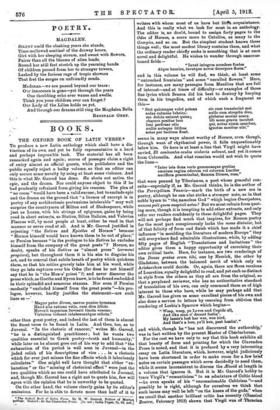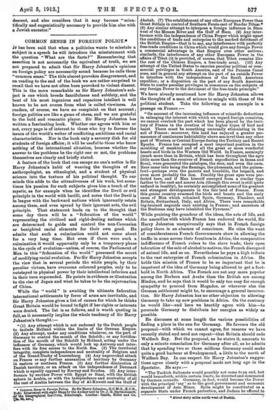BOOKS.
tinction of its own and yet be fully representative is a hard and perhaps impossible task. The material has all been
ransacked again and again; scores of passages claim a right of entry almost as official guests, while publishers and the public equally reject a bulky volume, so that an editor can only secure some novelty by using at least some violence. And -this is what Mr. Garrod has done. He shuts out satire, the epic, and the drama. Nor could anyone object to this if he had prudently refrained from giving his reasons. The plea of "no room" would have been a valid excuse; but to exclude epic and the drama on the ground that "a licence of excerpt is in poetry of any architectonic pretensions intolerable" may well surprise the countrymen of Milton and of Shakespeare, while just as Lucan, with his strings of epigrams, gains by being read in short extracts, so Statius, Silius Italicus, and Valerius Flaccus will, by most people at least, either be read in that manner or never read at all. And is Mr. Garrod justified in rejecting "the Satires and Epistles of Horace" because "Horace himself would have known them to be out of place," or Persius because "in the prologue to his Satires he excludes himself from the company of the great poets "? Horace, no doubt, speaks of his Satires as "almost prose" (sermani propiora), but throughout them it is his aim to disguise his art, and to conceal that subtle breath of poetry which quickens _them, so that his critics gravely take him at his word, while they go into raptures over his Odes (for does he not himself say that he is "the MUSF8' priest "?) and never discover the prose which, as Goethe and Byron knew, is lobe found embedded in their splendid and sonorous stanzas. Nor even if Persius -modestly "excluded himself from the great poets "—his pro- logue, however, hardly justifies the statement—are such lines as Maple pater divom, saevos punire tyrannos Haud alia ratione velis, cans dira libido Moverit ingenium ferventi tincta veneno: Virtutem videant intabescantque relicta."
• other than great poetry, and indeed the last of them is almost the finest verse to be found in Latin. And then, too, as to Juvenal. "In the rhetoric of rancour," writes Mr. Garrod, "he is a distinguished practitioner ; but he wants two -qualities essential to Greek poetry—truth and humanity,"
while later on he almost goes out of his way to add that "the !exhaustion of the period is well seen in Juvenal—in the
jaded relish of his descriptions of vice . . . in a rhetoric which for ever just misses the fine effects which it laboriously calculates." One might well have thought that either "ex- haustion" or the "missing of rhetorical effect" were just the two qualities which no one could have attributed to Juvenal, and, though Mr. Garrod has a right not to quote him, few will agree with the opinion that he is unworthy to be quoted. On the other hand, the volume clearly gains by its editor's omissions. For he is able to devote more than half of it to
• Th. Oxford Boo,c of Latin rerso. By Ir. W. Garrod, Fellow of Merton cane. 0.dordl At the Clarendon Pfe33. [6.3. net ; India Paper, 7s. 6d. net.]
writers with whom most of us have but UM acquaintance. And this is really what we look for most in an anthology. The editor is, no doubt, bound to assign forty pages to the Odes of Horace, a score more to Catullus, as many to the Georgics, and so on. But the simplest student knows these things well ; the most modest library contains them, and what the ordinary reader chiefly seeks is something that is at once novel and delightful. He wishes to wander through unaccus- tomed fields- "Iuvat integros accedere fontes Atque haurire, iavatque novos'decerpere fibres."
and in this volume be will find, we think, at least some "untouched fountains" and some "unculled flowers." Here, for instance, are many passages from Manilius that are full of interest—and at times of difficulty—or examples of those fine lyrics which Seneca did his best to destroy by burying
them in his tragedies, and of which such a fragment as this—
"Slot quicunque volet potens sic cum transierint mei
aulae culmine lubrico: nullo cum strepitu dies,
me dulcis saturet quies; plebeius moriar senex. obscuro positas loco illi mors gravis incubat leni perfruar otio qui, notus nimis omnibus, nullis notaque litibu.s ignotus moral= sibi."
aetas per taciturn fluat.
seems in many ways almost worthy of Horace, even though; through want of rhythmical power, it falls unquestionably below him. Or-here is at least a line that Virgil might have envied, Et coniventes oculos violaria solvunt, and yet it comes from Columella. And what rosarian would not wish to quote the lines—
"Inter ista dons veris gemmeasque gratias
omnitun regina odorum vel colorum Lucifer auriflora praeminebat, flamma Diones, rosa."
that were penned by Tiberianus, a poet whose graceful con- ceits—especially if, as Mr. Garrod thinks, he is the author of the Pervigilium Veneris—mark the birth of a new era in poetry, although he can also strike a stronger note,-as in that noble hymn to " the nameless God" which begins Omnipotens, annosa poli quern suspicit aetas? But we must refrain from quot- ing more, though it is tempting to add other extracts, and only refer our readers confidently to these delightful pages. They will not perhaps find much that inspires, for Roman poetry for the most part conspicuously lacks the mens divinior, but of that felicity of form and finish which has made it a chief influence "in moulding the literature of modern Europe" they will everywhere find admirable illustrations, while, by adding fifty pages of English "Translations and Imitations" the editor gives them a happy opportunity of exercising their own critical taste. Here, for instance, are two renderings of the Donee gratus eram tibi, one by Herrick, the other by Gladstone, between the balanced merit of which only an Aristarchus could decide. Or, again, there are diree versions of Lucretius, equally delightful to read, and yet each as distinct in style from the others as they all are from the original, so that a perplexed reviewer, who has no authoritative standard of translation of his own, can only commend them as of high interest to those who have, while he may perhaps add that Mr. Garrod has given us some excellent pieces of his own and also done a service to letters by rescuing from oblivion that rendering of Lesbia's Sparrow which begins-
" Weep, weep, ye Loves and Cupids all, And ilka man o' decent feelin' : My lassie's lost her wee, wee bird.
And that's a lose, ye'll ken, past healin'."
and which, though he "has not discovered the authorship,' was in fact written by the present Master of Charterhouse.
For the rest we have only to say that this book exhibits all that beauty of form and printing for which the Clarendon Press is noted, and that it is prefaced by a very interesting essay on Latin literature, which, however, might judiciously have been shortened in order to make room for a few brief notes on certain passages which seem decidedly to need them, while it seems inconsistent to discuss the .2Eneid at length in a volume that ignores it. But it is Mr. Garrod's hobby to trace Virgil's "romanticism" to an admixture of Celtic blood —he even speaks of his "unconscionable Celticism "—and possibly he is right, although for ourselves we think that such issues may well be left "on the knees of the gods," when we recall that another brilliant critic has recently (Classical Review, February 1913) shown that Virgil was of Thracian
descent, and also considers that it may become "scien- tifically and eugenistically necessary to provide him also with a Jewish ancestor."















































 Previous page
Previous page